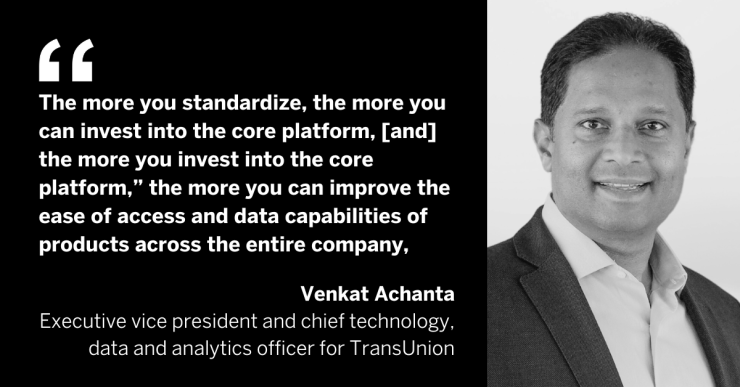
TransUnion, one of three major credit bureaus in the U.S., is launching a new cloud-based platform to create a unified portal for its suite of data analytics, credit risk and fraud detection offerings assisted by artificial intelligence.
The Chicago-based credit bureau officially debuted the platform, known as OneTru, on Wednesday. Through the new platform, TransUnion combines its preexisting hybrid cloud framework with an AI-powered platform it acquired in part through the
"Fragmented data sources and disconnected business applications can compromise access to analytic capabilities and increase time to insights. … TransUnion has brought together the complementary assets we have built and acquired in recent years to streamline data access and maximize the speed and quality of analytics and the decisions they drive," Chris Cartwright, president and chief executive of TransUnion, said in a press release.
Data sources stored within OneTru include credit bureau, consumer identity and marketing data, which are secured independent of one another according to proper governance requirements.
Financial institutions can access data sources housed within the OneTru platform through the individual products they already use through TransUnion, where data scientists and analysts with the necessary permissions can generate reports, interact with private and publicly available data and execute other real-time actions.
To make the data navigation process easier, TransUnion honed its large language models using retrieval-augmented generation techniques to provide answers grounded in both external and TransUnion data. The AI user guide can provide step-by-step explanations of how it generated its answer and how to navigate the platform. The model can consume visual documents like PDFs to pull relevant information while linking to the original source file.
Venkat Achanta, executive vice president and chief technology, data and analytics officer for TransUnion, said the launch of OneTru is just the first step in transitioning all the products offered by the firm to reposition around a unified platform.
"The more you standardize, the more you can invest into the core platform, [and] the more you invest into the core platform," the more you can improve the ease of access and data capabilities of products across the entire company, Achanta said in an interview.

Concerns regarding the safety and security of generative AI models have given many executives, even those already investing in such tools,
"This is new technology, so we need to make sure that we have the right frameworks in place as we innovate around AI, and make sure that your frameworks protect the trust and do not [diminish] the trust of customers," Rizwan Khalfan, executive vice president and chief digital and payments officer at TD Bank said at a panel conversation hosted by The Clearing House last year. "We cannot let them be compromised."
In the wake of the
With these concerns in mind, Achanta is working to ensure the new platform is nimble enough to adapt to any future changes in regulations and governance.






